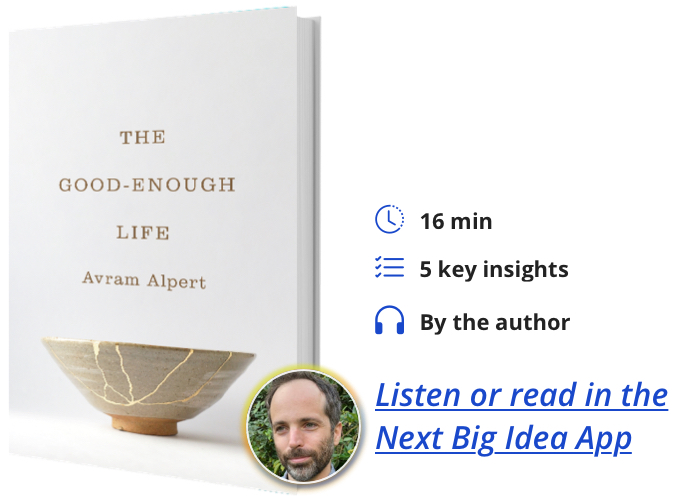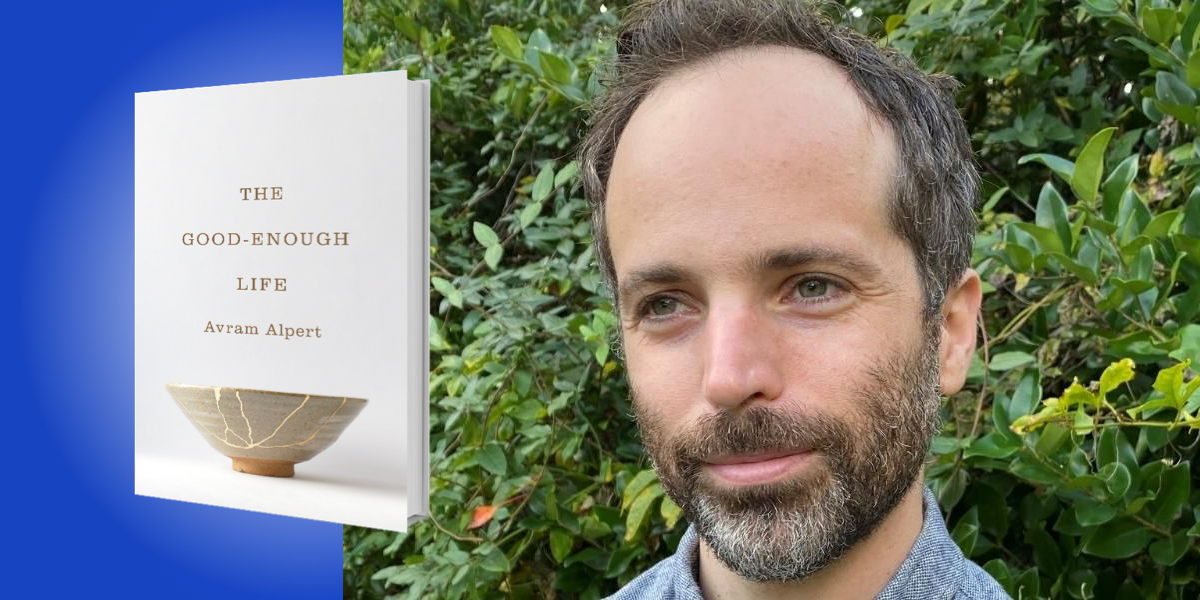Avram Alpert is a lecturer in the Writing Program at Princeton University and a fellow at The New Institute in Hamburg. He is also co-editor of Shifter Magazine and founded the Interdisciplinary Art and Theory Program at Jack Shainman Gallery.
Below, Avram shares 5 key insights from his new book, The Good-Enough Life. Listen to the audio version—read by Avram himself—in the Next Big Idea App.

1. We need a good-enough life for all.
When we think of being “good enough,” we might imagine doing the bare minimum. Like: I have five extra screws for this IKEA table, but I did good enough so that it won’t fall over. That phrase contains a profound truth about human life: even though life can never be better than good enough—that is, we cannot eliminate accidents, errors, and tragedies—achieving genuine good-enoughness for all could help us meaningfully deal with these imperfections. By “good-enoughness for all” I mean that everyone deserves a life suffused with both goodness (including decency, meaning, and purpose), and enoughness (including housing, food, care, and education). When we find ourselves in loving and sustainable communities, if anything does go wrong, we can help each other bear the difficulties of life.
Some of you are thinking, why not innovate our way to better than good enough? Why not have a great life for all? One of the best answers comes from an early champion of the good-enough philosophy: Donald Winnicott. Winnicott was a psychoanalyst who, in the 1950s, coined the term “the good-enough mother.” Winnicott had been studying early childhood parenting and saw that many parents try to do too much for their children. Logically, we don’t want our children to suffer, fear, or fail, but Winnicott realized that if we keep them from these basic experiences, then we stunt their capacities for adaptation, creativity, and wonder. Not only that, but in trying to do too much for their children, the parents themselves—forerunners of modern helicopter parents—were often anxious and burnt out. We should provide our children with sufficient emotional and material goods, but if we try to do more than that, we will max ourselves out and deny our children their capacity to deal with all the strangeness and wonder of life—the full complexity of being human.
As I’ve watched society provide endless rewards to some and not enough to many others, I’ve realized that Winnicott’s lessons about parenting have a lot to teach us about other aspects of life. An obsession with greatness—with competition to prove that we are better and more deserving than others—is robbing us of the complexity, nuance, and common decency of good-enoughness.
2. Great for some can never be good enough for all.
Some say that ensuring a sufficient life for all means using competitions to find the most talented few and then giving them all the support they need, because if we incentivize the best to pursue their talents, then their inventions will help us all. There is a genuine logic to the idea. We all live with the inventions of great scientists, the economic goods and services of great entrepreneurs, and the wonderful works of great artists and writers. It seems logical to keep trying to find more of these great people. But there are some real problems with putting too much into too few.
First of all, there’s no perfect way to find out who the most talented people are. Even Albert Einstein wandered in obscurity for many years because his wild and bold ideas often cost him rejection by his superiors. One more bad break, and Einstein’s ideas would have been lost forever. We have certainly lost other similar talents, as the evolutionary biologist and historian of science Stephen Jay Gould wrote, there is “near certainty that people of equal talent [as Einstein] have lived and died in cotton fields and sweatshops.” The trouble with looking for the great few is that it is an exclusionary practice. There are only so many leadership positions in society. Only so much esteem and attention. Only so much wealth. No matter how good our metrics of judgment, a competitive society will always exclude more talent than it unearths.
“No matter how good our metrics of judgment, a competitive society will always exclude more talent than it unearths.”
The problem isn’t just about finding the talented people, but also about what happens to society when we give excessive rewards of money and power to the few. Back in the 4th century BCE, the philosopher Aristotle saw that two kinds of inequality could tear society apart: inequality of property (wealth), and inequality of honor (power). He warned against letting inequality grow too much. Since then, social scientists have regularly found that societies in which there are vast divergences of wealth and power tend to have more violence, distrust, depression, and are more likely to fall into dictatorship or civil war. So, the double negative of greatness is that we have no guarantee of finding the most talented people, but in trying to do so, we create dangerous social instability by giving too much to too few.
3. We can collectively get more by individually doing less.
The basic idea of incentivizing competition is that it should bring out the best in each of us. The possibility of winning gives us something to strive for. Therefore, even those who don’t win should reap the benefits of some people getting the resources and doing extra work. But notice that, in many competitions, the ultimate winner is only marginally better than the other top competitors. By giving all of the resources to the winner, we are excluding much more talent than we are including. Not only that, but because the stakes are so high, we increase stress, anxiety, and burnout for everyone, while also sowing the seeds of inequality, distrust, and alienation between the winners and everyone else.
We think we are doing the right thing, but in fact we are missing out on so much more. Rather than exclusive competitions, we could have inclusive cooperations in which more people work together so that each participant could work a little less. There is good evidence that such collaboration works because, after all, competition often impedes progress. It silos knowledge and can prevent insights from cross-pollinating. The history of collaboration shows time and again what can happen when we break down these silos. Think of cooperation like sowing a field. If you want each plot to flourish, would you put all the water and fertilizer in one area? Or would you spread enough around to make sure each could grow and develop? Shared sense of purpose through cooperation can also mean that more people are involved in not only the process of discovery, but also the benefits. After all, in a market society, competition can create perverse incentives, such as keeping life-saving drugs from people in need simply because they cannot afford to pay for them.
Of course, it’s not easy to start doing less ourselves and do more in collaboration. Many social structures push us to competition. For instance, art gallerists and literary agents look out for individual talents to turn into stars. Even though it takes a whole team to produce a book, and books are the product of humanity’s collective knowledge, there is ultimately one author on the cover, and only so many spots on the bestseller lists. As a writer I can tell you, if you don’t sell a lot of books, you can’t make a living doing this. Even those like myself who criticize the system are forced to participate in order to keep working. While individuals may want less stress about making it to the top, and may very well want to collaborate more with others, this isn’t something we can always do on our own.
“Think of cooperation like sowing a field. If you want each plot to flourish, would you put all the water and fertilizer in one area? Or would you spread enough around to make sure each could grow and develop?”
4. Self-care and political reform are both necessary.
There is an unspoken tension in our lives. On the one hand, we are encouraged by our political economy to compete in order to prove that we are the most deserving of resources. On the other, we are encouraged by therapists and counselors to slow down and relax. Many self-care books tell us to expect less, be content with our limitations, and appreciate the lessons of failure. These are important life skills, but if done individually, without concern for the social world around us, we risk being modern day Neros, doing yoga as the world burns. At the same time, a more equal society full of abusive people won’t do us much better.
Good-enoughness is about being both good and enough. This isn’t just about a world where everyone has access to necessary material goods, but also access to wisdom about how to handle the difficulties of life, as well as appreciate the joys and wonder of existence. We can do a lot of this work on our own, but a truly good-enough world requires social change. This change cannot stop with humanity. We live on a planet that is careening from one ecological catastrophe to another. If we don’t change course soon, we may destroy the very systems that keep us alive. The earth is a miraculous, self-regenerating place, but not endlessly so. We currently take 1.7 times more than it can regenerate on a yearly basis.
5. Nature is sublime, but not for the reason philosophers have told us.
The sublimity of nature, as we know it from artists and philosophers, is mostly about how vast and overwhelming it is. 18th-century philosophers, like Edmund Burke and Immanuel Kant, exalted its sheer domineering scale, and even its capacity to crush us. When we experience this natural sublime, we have a mix of awe and terror. Kant argued that ultimately the feeling is affirmative: we realize that nature is greater than us, but our souls are great enough to survive. I can appreciate this feeling, but I have also had another experience of the sublime.
Walking is a big part of my writing process. Sometimes I was lucky enough to live near state parks when I was writing this book. During one of my walks in the springtime, I came across some small trees as their flowers were beginning to bloom. There was nothing awesome or terrifying about this. It wasn’t about me surviving nature or nature destroying me. And yet, looking at them, I had what I can only describe as a sublime feeling—a scary yet joyous sense of being part of something vaster than myself. But then, just as quickly, the joy vanished as I realized that I was scared that the planet, and the genesis of these blooms, is constantly in threat of being destroyed by our actions.
The awe and terror of nature isn’t about greatness. It’s about the fragility of an ecosystem that, in spite all of its own imperfections, is good enough to sustain life. It is awesome that it can provide enough for us. It is terrifying that it may not be able to do so much longer. For the earth to continue to be good-enough to support our existence, we have to learn to be good-enough to it. Good enoughness will never promise the wonder of perfection, but it can promise the sublime feeling of being part of a decent, caring, and sustainable world.
To listen to the audio version read by author Avram Alpert, download the Next Big Idea App today:
































